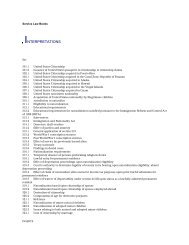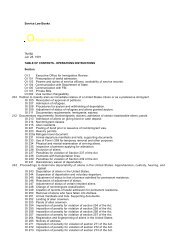Create successful ePaper yourself
Turn your PDF publications into a flip-book with our unique Google optimized e-Paper software.
<strong>Inspector's</strong> <strong>Field</strong> <strong>Manual</strong><br />
application for a refugee travel document from an alien who is outside the United States or applying for entry at<br />
a port-of-entry. The alien must submit Form I-131, Application for Travel Document, with fee, and must<br />
establish that he or she did not intend to abandon his or her refugee status, that he or she did not engage in<br />
activities while outside the United States inconsistent with continued refugee status, and that he or she has been<br />
outside the United States for less than 1 year. [See 8 CFR 223.2.] If you are satisfied that the alien is the<br />
individual he or she claims to be and is still entitled to refugee status, you may accept the application; if you are<br />
not so satisfied, you should not accept the application. If all the necessary information is available, including<br />
photographs, you may adjudicate the application and forward it to the Nebraska Service Center, attention:<br />
Special Operations Officer for production of the refugee travel document. If you are at a port of entry and the all<br />
necessary information is available but the alien does not have the required photographs and it is not possible to<br />
produce one at the port of entry, you may still approve the application and forward it to the Nebraska Service<br />
Center, instructing the alien to obtain and forward the photographs to the Special Operations Officer at that<br />
service center. You should attach a memorandum to the Special Operations Officer advising that the application<br />
has been accepted and approved in accordance with 8 CFR 223. Admit the alien as a refugee by endorsing a<br />
Form I-94 with the refugee admission stamp, as above.<br />
If you are satisfied that the alien is a returning refugee, but do not have sufficient information to adjudicate the<br />
application, you may defer the alien's inspection using the procedures in Chapter 17.1. See also Chapter 17.15 for<br />
expedited removal processing of aliens with refugee claims that cannot be verified.<br />
(c) Special procedures for adjudication of Refugee Travel Documents for aliens appearing at overseas INS<br />
offices. Effective April 1, 1997, overseas district directors also have discretionary authority to accept and<br />
approve applications for Refugee Travel Documents under the same circumstances as indicated above. Once the<br />
application has been approved and forwarded, with photographs, to the Nebraska Service Center,<br />
(d) "Following to join" dependents. The spouse and children of a refugee, if not separately eligible for refugee<br />
status, may follow to join the principal refugee, whether the principal has remained in refugee status or has been<br />
admitted for permanent resident. The qualifying relationship must have existed when the refugee was granted<br />
status and must continue to exist. Approval of such status is accomplished by submission of a Form I-730, and<br />
issuance of a "Visas 93" cable by the approving office to the consular post where the dependent resides. Based on<br />
the cable, the consul will issue a "boarding letter" to be presented to the transportation company, permitting the<br />
alien to travel to the United States. If found admissible, parole the alien for one year, endorsing the I-94 with the<br />
parole stamp, noted "Visas 93", and the port, date and stamp number. In some instances, the consul will issue a<br />
visa noted "Visas 93" rather than a boarding letter. The admission procedures are the same in such cases.<br />
16.3 Asylees and Asylum Applicants.<br />
(a) General. Asylum applicants are aliens whose claims of eligibility for asylum have not been finally decided.<br />
Asylees are persons who have been granted asylum, but who either have not applied for or have not been<br />
granted adjustment pursuant to section 209(b) of the Act. Either category may travel and be readmitted if<br />
granted an advance parole. An asylee may also be issued a refugee travel document. If you are satisfied the<br />
asylee or asylum applicant is otherwise admissible, parole for one year, endorsing the I-94, and I-512 or I-571,<br />
with the parole stamp, date, port and stamp number. Endorse the parole stamp: "asylee" or "asylum applicant"<br />
as appropriate. Return the I-571 or I-512 to the alien if it is valid for multiple entries and not nearing expiration.<br />
If expiring or valid for a single entry, lift the document and forward it to the appropriate files control office.<br />
Note: some ports-of-entry use an "asylee" stamp rather than a parole stamp for these admissions.<br />
The same provisions discussed in Chapter 16.2 relating to previously admitted refugees who departed the<br />
United States without having obtained a refugee travel document or advance parole also apply to asylees. If you<br />
are satisfied that the alien meets the criteria discussed in 8 CFR 223.2, you may accept the application on Form<br />
I-131 and adjudicate it at the port-of-entry or defer the inspection for adjudication at the onward office. If the<br />
application is approved at the port-of-entry, follow the same steps as if admitting an asylee with a refugee travel<br />
document, and forward the approved application to the Nebraska Service Center for production of the refugee<br />
travel document. See also Chapter 17.15 for expedited removal processing of aliens with asylee claims that<br />
cannot be verified.<br />
(b) "Following to join" dependents. The spouse or children of an asylee may also be granted asylum if they are<br />
accompanying or following to join the principal asylee. The relationship with the asylee must have existed at the<br />
time the asylum application was approved. Also, the family member must not fall within any of the mandatory




